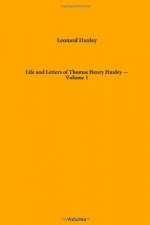|
This section contains 30,088 words (approx. 101 pages at 300 words per page) |

|
SOURCE: T. H. Huxley: Man's Place in Nature, University of Nebraska Press, 1978, pp. 1-9, 11-45, 165-96.
In the following excerpts, Paradis examines Huxley's early, romantic scientific view and his later view that man's hope lies in his moral objection to natural determinism. Paradis also explores Huxley's conception of the role of the scientist in understanding humankind's existential condition, comparing it specifically with Matthew Arnold's view as expressed in Culture and Anarchy.
Introduction
Nothing great in science has ever been done by men, whatever their powers, in whom the divine afflatus of the truth-seeker was wanting.
T. H. Huxley, "The Progress of Science: 1837-1887"
The Victorian debate over the challenge offered by the new science to traditional concepts of man and man's place in nature found its most prophetic focus in the clear, forceful argument of T. H. Huxley's generalist or popular essays. Huxley, whose professional reputation as a...
|
This section contains 30,088 words (approx. 101 pages at 300 words per page) |

|


